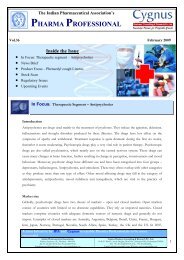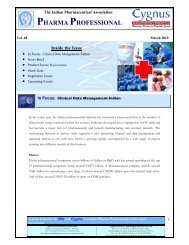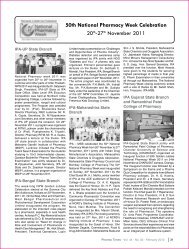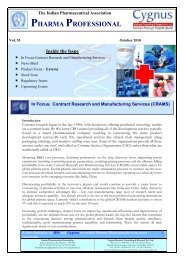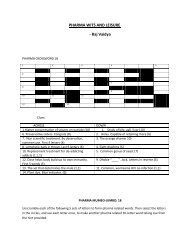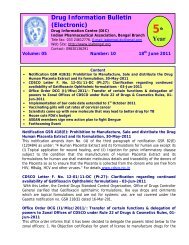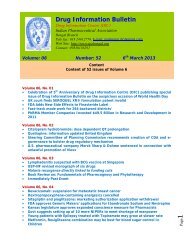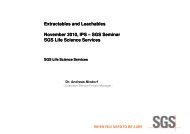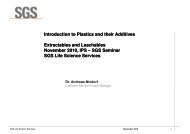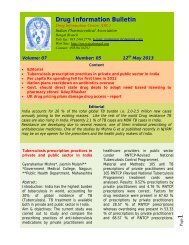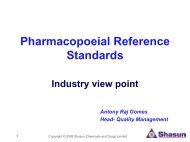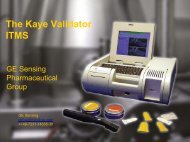Interview: Dr. Evans Coutinho - Indian Pharmaceutical Association
Interview: Dr. Evans Coutinho - Indian Pharmaceutical Association
Interview: Dr. Evans Coutinho - Indian Pharmaceutical Association
Create successful ePaper yourself
Turn your PDF publications into a flip-book with our unique Google optimized e-Paper software.
<strong>Interview</strong><br />
whatever you do you should be dedicated, disciplined<br />
and devoted to the field you are ‘in’....<br />
were the thoughts of a ‘Good Teacher’ - <strong>Dr</strong>. <strong>Evans</strong> <strong>Coutinho</strong>, as<br />
expressed to undergraduate students - Harshil Renawala, Misbah<br />
Momin, Prutha Desai and Chintan Mehta.<br />
P.T. How was your journey from an undergraduate B.Sc.<br />
(Tech) student to the HOD-<strong>Pharmaceutical</strong> Chemistry?<br />
<strong>Dr</strong>. <strong>Coutinho</strong>: I enrolled for my B.Sc. course at Parle College<br />
which is now known as Sathaye College in Mumbai. I did well in<br />
my final year which helped me to get admission into B.Sc. (Tech)<br />
at UDCT in the stream of <strong>Pharmaceutical</strong>s and Fine Chemicals.<br />
There were 7 branches of specialization in B.Sc. (Tech) - Foods,<br />
Oils, <strong>Pharmaceutical</strong>s, Paints, Polymers, Textiles and Dyes. In<br />
<strong>Pharmaceutical</strong>s and Fine Chemicals the intake was just 18 at<br />
that time. As the selection was on All-India basis, the competition<br />
was really stiff. The top rated course at that time was Polymers,<br />
Plastics and Paints but considering that <strong>Pharmaceutical</strong>s was an<br />
evergreen field, I took the advice of a friend and enrolled for the<br />
<strong>Pharmaceutical</strong>s and Fine Chemicals course. I completed my<br />
B.Sc. (Tech) having secured the First Rank in the University. I had<br />
actually intended to quit at that point and work in the industry. So,<br />
I applied for a few job openings in the pharmaceutical industry but<br />
my perceptions changed after my results were declared. As I had<br />
topped the University, there was pressure from my peers to study<br />
further and so I continued with M Sc. (Tech) at UDCT. At that time<br />
we had to select our guide and <strong>Dr</strong>.S.K.Pradhan, an internationally<br />
noted organic chemist who had also worked under Sir Derek<br />
Barton (a Nobel Laureate!) wanted me to join his lab. However, he<br />
was known to be very demanding and thus I was apprehensive of<br />
working in his lab. I eventually decided to join <strong>Dr</strong>. Radhakrishna<br />
Iyer, another stalwart, who himself was a student of <strong>Dr</strong>. Pradhan.<br />
After I completed two years of M Sc. (Tech), I had no intentions<br />
of doing a PhD although both <strong>Dr</strong>. Pradhan and <strong>Dr</strong>. Radhakrishna<br />
Iyer wanted me to stay back and pursue a PhD at UDCT. Chance<br />
had it that I came across an advertisement in the <strong>Indian</strong> Express<br />
about vacancies at Bombay College of Pharmacy (BCP) in 1986,<br />
for which I applied and got selected as a Lecturer. During that time<br />
<strong>Dr</strong>. <strong>Evans</strong> <strong>Coutinho</strong> did his B.Sc(1981), B.Sc. (Tech) (1984),<br />
M.Sc.(Tech) (1986), and PhD(1989) on his journey to becoming<br />
the Professor and HOD- <strong>Pharmaceutical</strong> Chemistry at Bombay<br />
College Of Pharmacy. In addition of having a teaching experience<br />
of more than 25 years, <strong>Dr</strong>. <strong>Coutinho</strong> is also an active researcher<br />
in the field of Computer-Aided <strong>Dr</strong>ug Discovery (CADD) and has<br />
guided several Masters and PhD students. He is at ease being a<br />
UG teacher and a PG mentor and is routinely invited for both UG<br />
and PG lectures and research presentations. He is lovingly called<br />
“Walking Chemistry” by many of his students and peers!<br />
Here is a peek at his life journey from his younger days…<br />
<strong>Dr</strong>. Tipnis was the Principal and <strong>Dr</strong>. V.M.Kulkarni was a Professor<br />
in the chemistry department of the college. Both were impressed<br />
with my interview and it was they who encouraged me to pursue<br />
my PhD alongside my lectureship. I joined <strong>Dr</strong>. V.M.Kulkarni for my<br />
PhD program and together we embarked on molecular modeling<br />
that was quite novel in those days. We did not have enough<br />
facilities at Bombay College of Pharmacy for practicing molecular<br />
modeling. It was then that <strong>Dr</strong>. V.M.Kulkarni who had done his first<br />
post doc in TIFR introduced me to the institute and to Prof.A.Saran &<br />
Prof.R.V.Hosur. This set me on a path of working on computational<br />
chemistry for my PhD using the facilities at TIFR. On seeing my<br />
potential as a Lecturer, Prof. Tipnis encouraged me to apply for<br />
the post of Asst. Professor for which I was selected in 1992. From<br />
then on I built my own research facilities at BCP and started guiding<br />
students for the M.Pharm and PhD program. In 1997 there was a<br />
vacancy for the Professor’s position. Once again the management<br />
of the college encouraged me to apply for the position; the Selection<br />
Committee was impressed with my research work and offered me<br />
the post of Professor of <strong>Pharmaceutical</strong> Chemistry and also the<br />
HOD of <strong>Pharmaceutical</strong> Chemistry. I was the youngest person to<br />
be selected as a professor at the age of 36 in BCP!<br />
P.T.: Why did you opt for a career in pharmacy inspite of<br />
your qualifications in pure sciences?<br />
<strong>Dr</strong>. <strong>Coutinho</strong>: I haven’t really pursued a course in pure<br />
sciences other than my B.Sc. in Chemistry. I did my B.Sc. (Tech)<br />
in <strong>Pharmaceutical</strong>s and Fine Chemicals. The only difference<br />
between B. Pharm and B.Sc. (Tech) in <strong>Pharmaceutical</strong>s is that<br />
in B.Sc. (Tech) you learn all the pharmacy subjects plus a lot of<br />
chemical engineering aspects including unit operations, process<br />
controls, instrumentation, heat and mass transfer, etc. It was really<br />
a very rigorous course with about 13 subjects in a year. It is a<br />
technology course and it puts you in a position well suited to be in<br />
the industry. The course did encompass core pharmacy subjects like<br />
pharmaceutics, pharmacology, biochemistry, microbiology except<br />
we did not study pharmacognosy in those days. So, pharmacy was<br />
in my blood right from my UDCT days.<br />
P.T.: Please share some of your experiences during your<br />
undergraduate years.<br />
<strong>Dr</strong>. <strong>Coutinho</strong>: My student years at UDCT were very silent and<br />
uneventful. The course syllabus was too hectic and needed constant<br />
attention all along, so I found it difficult to pursue any other interests.<br />
One thing about UDCT is that the environment over there is guided<br />
by a strong ethos of learning and excellence. Neither the professors<br />
nor the curriculum let you rest. You got to be a genius to be able to<br />
Pharma Times - Vol. 44 - No. 03 - March 2012 14
manage and pursue other interests other than your work. So all 18<br />
of us had quiet and uneventful years! Also since this was technically<br />
our second graduation (after B.Sc. in Chemistry), we had become<br />
quite mature and sober. There is nothing really remarkable that I<br />
can comment upon about my UG years! Also at M.Sc. (Tech) which<br />
was strongly driven by research goal, you couldn’t ‘fool’ around. We<br />
devotedly worked in the lab from 8:00 in the morning up to 9:00 in<br />
the evening, even on weekends and holidays!<br />
P.T.: What sort of problems do you encounter in your<br />
research work?<br />
<strong>Dr</strong>. <strong>Coutinho</strong>: I made use of the facilities at TIFR during my<br />
PhD program. Over there I had complete access to the computers,<br />
NMR facilities and other equipments. <strong>Dr</strong>. Tipnis was very gracious<br />
to spare me the time to work at TIFR as I also had to fulfill my duties<br />
as a Professor at BCP. The only obstacle was travelling to TIFR<br />
which is located at Colaba (quite away from BCP). But, once I was<br />
at TIFR I had unrestricted access to NMR machines and computer<br />
systems there. When I had to start my own research work at BCP,<br />
I had to build my own facility and that was a bit difficult. I really had<br />
to struggle for grants to set up the whole facility with sophisticated<br />
hardware and software needed to practice CADD. Over the years<br />
I have been able to build up the facilities, computers and the lab.<br />
More than that, the Principal and the management of the college<br />
did provide strong support for research, without any interference.<br />
The main problem was that molecular modeling was an upcoming<br />
area and many of the students needed to be taught the basic. In the<br />
past we did struggle a bit to train our students in this area to initiate<br />
research in CADD. But now that the syllabus covers molecular<br />
modeling, the effort in teaching is less strenuous.<br />
P.T.: Pharmacy being an applied science, what importance<br />
do you give to strong basics in fundamental sciences?<br />
<strong>Dr</strong>. <strong>Coutinho</strong>: I don’t think there is anything in applied science<br />
which you can do without understanding basic science, i.e.,<br />
Chemistry, Physics, Mathematics and Biology. I still go back and<br />
read fundamental books much more than I read advanced topics.<br />
I strongly believe that understanding the basic is quite essential<br />
before trying to do anything advanced. If your basics are weak than<br />
you can neither do anything advanced nor applied. Everything boils<br />
down to understanding the fundamentals. There are two reasons<br />
why I still like to revise my basics. It is because I think I can teach<br />
better and I can do my research better. So, it is imperative as an<br />
applied science that you understand the basic thoroughly.<br />
P.T.: What approach should a student have towards his/her<br />
studies during undergraduate B. Pharm years?<br />
<strong>Dr</strong>. <strong>Coutinho</strong>: I feel there is a difference in the attitude and<br />
mindset of students pursuing pharmacy now than what I observed<br />
when I joined this college back in 1986. I do not know whether it is<br />
peer pressure that is driving students to take up B. Pharm course<br />
or something else, because I have seen through these years that<br />
students who are not really inclined towards the course take it up.<br />
But, all said and done, once you come into B. Pharm you must<br />
realize that it is going to be your profession. You may diverge after<br />
B. Pharm to doing something in finance or MBA or some thing<br />
totally different. But whatever you do you should be dedicated,<br />
disciplined and devoted to the field you are ‘in’. You may not end<br />
up as a practicing pharmacist but there are certain things in your<br />
education which mould your thinking, reasoning and guide you to<br />
discipline and organize yourself. You may not remember all the<br />
definitions but there are certain things in your course which need<br />
emphasis like writing things methodologically, rationalizing your<br />
observations, arguing your results, developing a holistic view and<br />
being systematic and careful. These are the things that will be of<br />
use to you all through your life. These are the traits which you will<br />
carry later in your life. This is the ultimate goal of your education.<br />
P.T.: What are the core subjects in pharmacy curriculum<br />
that a student should be thorough with? What subjects<br />
according to you should be given more weightage?<br />
<strong>Dr</strong>. <strong>Coutinho</strong>: I would say that a student should be completely<br />
thorough with the basics in Physical Pharmacy, Organic Chemistry,<br />
Pharmacology and Pharmaceutics. To top it all, I’d say Analysis<br />
is one area that is by far the most critical, especially because of<br />
its role in fields like Pharmacology, Pharmacognosy, Formulation<br />
development etc, all of which does require some or the other<br />
analytical techniques in their evaluation. I think that Analysis is a<br />
subject in which students should take an active interest in. I’d also<br />
love to see Molecular Biology being covered to a larger extent<br />
in the B.Pharm syllabus. It is a subject that is sadly neglected<br />
in our curriculum. Many of our students pursuing their Masters<br />
and Doctoral studies in biological sciences abroad would find the<br />
principles of Molecular biology quite handy and useful. So, I think<br />
Mol Bio is one subject that would equip a pharmacist with skills to<br />
be a good researcher.<br />
P.T.: Do you believe that there needs to be a change in<br />
the framework of the present pharmacy undergraduate<br />
curriculum to meet the current requirements?<br />
<strong>Dr</strong>. <strong>Coutinho</strong>: I think that the current syllabus covers the basic<br />
subjects in a good way. Having said that, I’d love to see the syllabus<br />
being updated more frequently to keep up with the present global<br />
trend. The syllabus has become quite ‘old’ and many of the aspects<br />
in the syllabus are ‘outdated’. So, there needs to be a mechanism<br />
to constantly update the curriculum with newer understanding.<br />
We face a few constraints in doing this. The curriculum needs to<br />
be reviewed keeping in mind that the faculty in all colleges under<br />
the umbrella of the University are competent enough to teach the<br />
new aspects in pharmacy. But, the fact remains that with many<br />
colleges still struggling to find good teachers, not all can be at<br />
the same level with respect to teaching a ‘modern’ syllabus. Only<br />
those institutes, which through years of productive research and<br />
exceptional teaching, have gained competency, will be able to do<br />
good justice to a ‘modern’ syllabus. One way out of this predicament<br />
is that colleges go in for autonomy. This would allow them to have<br />
a tailor made syllabus suited to their strengths and skills. This<br />
definitely would prove to be mighty useful for students studying in<br />
these colleges.<br />
P.T.: Sir, please elaborate on the importance of<br />
communication and presentation skills amongst pharmacy<br />
professionals.<br />
<strong>Dr</strong>. <strong>Coutinho</strong>: The ability to communicate clearly and effectively<br />
is important in all spheres of life including ones’ professional life. It<br />
is essential that a student is good in his/her grammar and diction.<br />
That would surely enable the student to put forth his/her ideas and<br />
thoughts convincingly to peers or to reviewers. Communication skill<br />
does not imply talking in a flowery and fancy way. It rather implies<br />
the ability to put your point across to a group of people convincingly<br />
and clearly. A good test of our communication skills is when we<br />
try to present our ideas to a lay man and are able to convince<br />
him. Now that is indeed tough! I would suggest that an English<br />
course emphasizing especially on grammar, writing, speaking and<br />
presentation skills in our syllabus would go a long way in honing<br />
the communication skills of our students.<br />
P.T.: How is the industry looking at CADD as a tool for<br />
procuring breakthrough molecules of industrial relevance?<br />
Have any molecules made it to the market or are in the<br />
pipeline?<br />
<strong>Dr</strong>. <strong>Coutinho</strong>: Presently there are very few industries working<br />
on CADD. This is because people at the helm of affairs in the<br />
Pharma Times - Vol. 44 - No. 03 - March 2012 15
industry are not really convinced about the utility of CADD mainly<br />
due to their lack of understanding about the area. I have, in the<br />
past, faced very stiff opposition from the ‘managers’ of some of the<br />
top level industries while convincing them about CADD’s potential<br />
to deliver. Also, since both the software and the hardware that<br />
are essential to run computational drug development are quite<br />
expensive, it isn’t cheap to establish a CADD centre in the industry.<br />
Industries where the ‘head of research’ has some background in<br />
CADD are indeed adopting it for drug design and development.<br />
Astra Zeneca, Ranbaxy, <strong>Dr</strong> Reddy’s are among the few using CADD<br />
effectively for drug design in India.<br />
<strong>Dr</strong>ugs like ciprofloxacin, donepezil, indinavir, etc, are products of<br />
CADD. The <strong>Indian</strong> academia has widely accepted CADD as a tool<br />
for drug designing. I see a lot of institutions across India that has<br />
started practicing CADD. So, I’d say down the line when some of<br />
the students from these institutions would occupy high positions in<br />
the industry, CADD would be accepted more easily in the research<br />
arsenal of the pharmaceutical industry.<br />
P.T.: What are the new avenues in India and abroad for<br />
students aspiring to have a career in molecular modeling<br />
and drug designing?<br />
<strong>Dr</strong>. <strong>Coutinho</strong>: In India not many industries are actually<br />
practicing CADD, so there isn’t a great requirement for a lot of<br />
people trained in it unlike other fields. It is not like a manufacturing<br />
unit that requires many people: a CADD lab can easily be manned<br />
by 2 to 3 people. Students pursuing their PhD’s in CADD are<br />
thus finding it difficult to strike satisfying jobs. Many students<br />
go abroad where there are more opportunities. CADD is not<br />
only about designing drugs. There are other fields which do<br />
use some element of computational modeling. In India there is<br />
still a lot of hesitation in applying CADD in other areas. There’s<br />
certainly much need for introducing molecular modeling in all<br />
areas of pharmacy.<br />
P.T.: How industry oriented is the research in colleges?<br />
<strong>Dr</strong>. <strong>Coutinho</strong>: There is some element of industry directed<br />
research in certain ‘good’ colleges, especially where there is strong<br />
interaction between the teachers and the industry. But mostly<br />
projects given by the industry deal with problems that are very<br />
mediocre and ordinary. They hardly support work on some novel,<br />
path breaking research that is of a basic fundamental nature. I<br />
believe that the industry and academia should join hands on novel<br />
path breaking ideas, working on things that are “out of the box”.<br />
P.T.: Like Bachelors in Engineering where a student<br />
selects a field at the entry level, do you think that the<br />
same can be done with B.Pharm where a student selects<br />
a field say clinical research, formulation development or<br />
pharmacology etc. Do you see this as a good alternative<br />
to the present system?<br />
<strong>Dr</strong>. <strong>Coutinho</strong>: No, I really don’t think that specialization should<br />
be done at the B.Pharm level. I feel a student should first learn the<br />
fundamentals in the core pharmacy subjects during the four years of<br />
the undergraduate program. An early specialization in one particular<br />
area will lead to the students missing out on the fundamentals in<br />
other subjects. How can a student be good at Pharmaceutics if he/<br />
she doesn’t understand Pharmacology or Biochemistry fully? How<br />
can you develop a formulation if you do not understand the stability<br />
requirements of the drug that depends on its chemistry? All the core<br />
subjects of pharmacy are dependent on each other. No one can<br />
master any one area without gaining a certain level of expertise in<br />
the other areas. So I strongly assert that specialization would be a<br />
better option during the post graduate years.<br />
P.T.: What makes you so passionate about teaching and<br />
how do you sustain it even after 25 years of teaching?<br />
<strong>Dr</strong>. <strong>Coutinho</strong>: Honestly, when I look back I don’t think I was<br />
‘fit’ to adapt to the industry environment. Early on in my life I did<br />
recognize that I had some traits as a teacher and also I did have a<br />
passion for it. My mother was a teacher and so was my aunt and<br />
several other relatives. One could say that teaching is in my “family<br />
blood”. I think I have chosen the correct line. I have enjoyed every<br />
moment of it. Teaching gives me a lot of satisfaction especially when<br />
I am able to put forth ideas convincingly to students.<br />
P.T.: How do you balance your career, professional and<br />
personal life?<br />
<strong>Dr</strong>. <strong>Coutinho</strong>: It is tough to juggle all the three. I manage it by<br />
devoting quality time to all these. During my vacation time, it is just<br />
‘vacation’ with my family. I totally ‘close out’ everything related to<br />
my professional life. However while on vacation I do attend to the<br />
problems of my research students. During working days my family<br />
respects my time for professional work. I think I balance things<br />
reasonably well with the support of my family!<br />
Announcement<br />
This is to inform that the AAiPS has decided to<br />
discontinue with the Distinguished Educator &<br />
Researcher Award this year. We had featured an<br />
announcement regarding this award in the February<br />
2012 issue of Pharma Times. We therefore request<br />
our readers to not send applications for the same. We<br />
regret the inconvenience caused on this account.<br />
ATTENTION MEMBERS<br />
RENEWAL OF MEMBERSHIP FOR<br />
THE YEAR 2012-2013<br />
Dear Members;<br />
Your annual membership is expiring on 31 st March 2012. Please<br />
renew your membership at the earliest.<br />
Please note that Service Tax will now be applicable on all types<br />
of membership fees of IPA with effect from 1st December 2011.<br />
The applicants are therefore requested to add an amount of<br />
10.3% (current rate of Service Tax) on the respective membership<br />
fees.<br />
Kindly note, April 2012 issue will be the last issue for those who do<br />
not renew their annual subscription for the year 2012-2013.<br />
Table for Membership fees per annum (Inclusive of Service Tax)<br />
Ordinary members Rs. 662/.<br />
Associate members Rs. 1103/.<br />
Student members Rs. 165/.<br />
Institutional members Rs. 13236/.<br />
IJPS Subscription (for IPA members) Rs. 900/.<br />
Cheque/DD should be in favor of “THE INDIAN PHARMACEUTICAL<br />
ASSOCIATION” payable at Mumbai.<br />
Please send your membership fees to<br />
<strong>Indian</strong> <strong>Pharmaceutical</strong> <strong>Association</strong>,<br />
C/o. Bombay College of Pharmacy, Kalina,<br />
Santacruz (E), Mumbai – 400098.<br />
Tel: 26671072 , Tele Fax: 26670744.<br />
E-mail: ipacentre@ipapharma.org<br />
Pharma Times - Vol. 44 - No. 03 - March 2012 16



